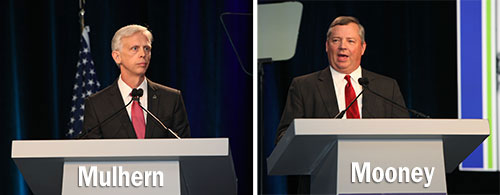
Photo credit: Christie's Photographic Solutions
"The Margin Protection Program, in its first year, really has not been tested yet for the conditions it was created to address," added NMPF Chairman Randy Mooney. "The MPP was designed for catastrophic conditions, like what we saw throughout 2009 and during part of 2012," explained the Missouri dairyman on October 27. "As challenging as this year has been, the margins of 2015 have dropped to around the $8 level, which is about the average margin our industry has experienced over the past 15 years. Painful, yes, but not devastating," Mooney added.
"So far in 2015, the MPP has made small payments to those farmers who elected the maximum $8 coverage level. Those who paid less in premiums for lower margin coverage haven't received a payout. That's how insurance of any kind is designed to work," said Mulhern in his joint annual address with Mooney. "The MPP is a catastrophic risk management program to protect against the worst-case scenario. This evolution toward a much more limited government safety net approach has been one of the major changes in farm legislation in the 30-plus years that I've been working on farm bills. And it is clear that Congress is not going to return to the days of price supports – nor should it," stated the dairy policy specialist.
"And for those wondering how MPP stacks up against its predecessor, the old MILC program would not have paid a penny this year to any dairy farmer in the country. Milk prices have been well above the trigger level for that now-defunct program," Mulhern said.
"So what we need to focus on is how we can make the MPP better," said Mooney.
"We were pleased last month when USDA granted our request for farmers to have additional time, until November 20, to sign up for coverage next year. USDA also granted another of our requests to allow for more payment flexibility. Co-ops can now collect premium payments monthly, and next year's premiums aren't due until September 2016," Mooney recounted.
"And we are looking for other ways to strengthen the program. Perhaps the biggest adjustment, as it is with any brand-new program, is one of expectations. The MPP won't make you money, but it will help keep some from losing the farm," Mooney concluded.








